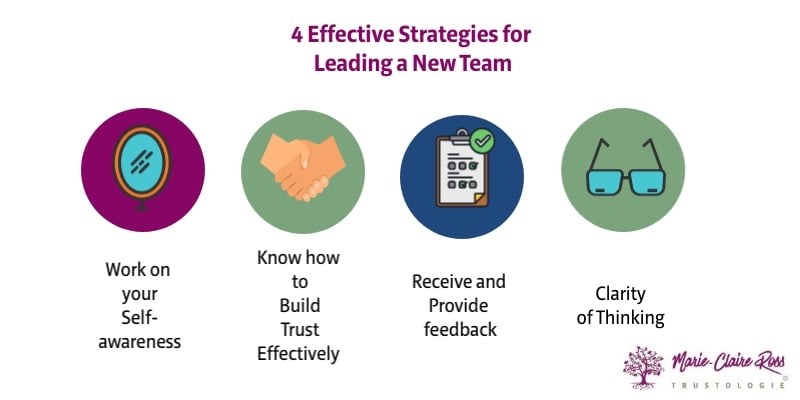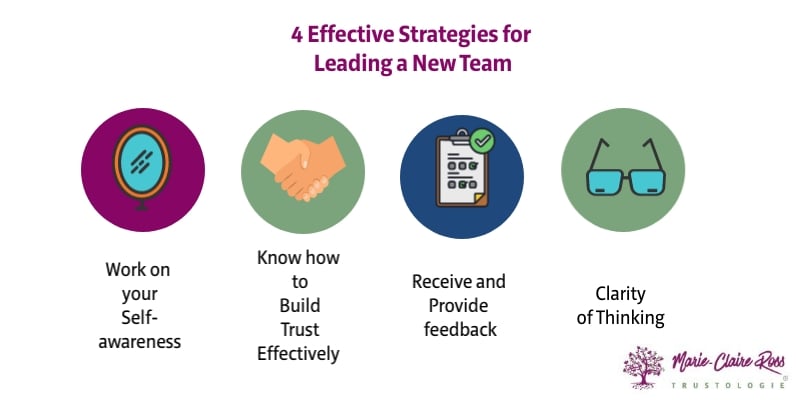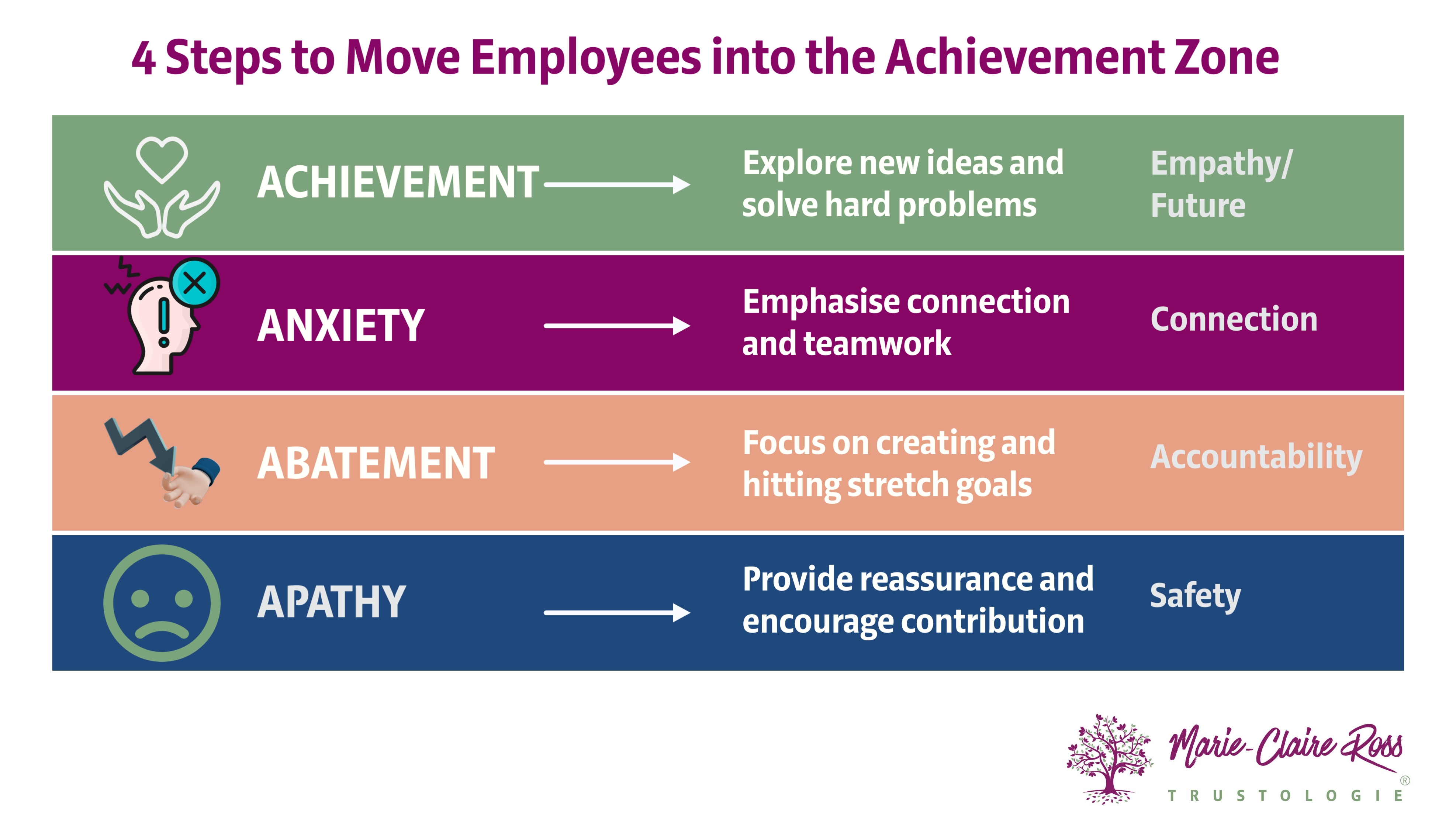9 min read
5 Ways Emotional Intelligence Transforms Your Leadership Presence Today
True leadership presence isn’t a performance or a set of charisma hacks; it is the felt experience of who you are being in the room. By cultivating...
Develop leaders, strengthen executive teams and gain deep insights with assessments designed to accelerate trust and performance.

Transform how your leaders think and perform with keynotes that spark connection, trust and high-performance cultures.

Explore practical tools, thought-leadership and resources to help you build trusted, high-performing teams.

Trustologie® is a leadership development consultancy founded by Marie-Claire Ross, specialising in helping executives and managers build high-trust, high-performing teams.

5 min read
Marie-Claire Ross : Updated on September 3, 2024

So you've just been elevated to the position of leading a brand new team - congratulations! No matter if this is your first time or you're a seasoned team leader, it's completely natural to feel a mix of excitement and apprehension as the weight of responsibility settles in.
And for good reason.
Unfortunately, it has been estimated by CEB 60% of all new managers fail within the first 24 months of their new position.
The main reason?
A lack of training on how to effectively manage people.
According to the Center for Creative Leadership, more than 25% of first-time managers, openly admitted that they felt unprepared to take on the responsibility of leading others. Shockingly, nearly 60% of individuals reported never receiving any form of training when they stepped into their initial leadership role.
While these research studies may make any new team leader feel a bit queasy, the truth is that you don't have to be a statistic.
As someone who regularly trains and coaches new team leaders to step confidently into their new role, there are four things that you need to learn to ensure you, and your team's, success.

Self-awareness has two parts to it - internal self-awareness and external self-awareness.
Internal self-awareness is about knowing who you are - your strengths and weaknesses. It involves being able to self-manage you emotions and your time. A self-aware person knows who they are, what they want to accomplish
External self-awareness involves understanding and recognising how others perceive us. It is about being attuned to the way we are viewed by those around us. It involves actively seeking out, and valuing, other people's perspectives.
Self-awareness is really about bridging the gap between how we see ourselves and how others see us. This requires being prepared to challenge your own views and seeking feedback on your blind spots.
An un-self-aware person doesn’t know who they are, what they stand for or how their teams see them. They unintentionally damage relationships and create distrust.
Self-awareness is a challenging learning journey. It takes time and you can't learn it in a one day leadership course.
Trust is the cornerstone of business. It’s the basis of every human relationship, every interaction, every communication, every initiative, every work project and even any strategic imperative you need to accomplish.
Trust is essential. Without trust, there is no meaningful connection between people, it’s just meaningless co-ordination.
Leading a team means understanding that trust is two-way. It also means understanding that it doesn't happen on its own - you have to work on it.
The ultimate expression of trust is when it is shared or reciprocated.
In any workplace relationship, both parties are responsible for building trust. Yet, we speak about it in one-way terms such as "How can I get people to trust me so I can push through this initiative?" or "He doesn't get his work done on time, so I can't trust him."
The best form of trust we can aim for is when both parties openly work towards understanding each other's expectations, ways of working and a shared understanding of how to trust one another.
In any workplace, you have to build shared trust, through open dialogue with:
In the Tribe of Trusted Leaders Leadership Mastermind, managers learn how to run safe, connected one-on-one's and meetings that ensure people feel like they have a shared future together. Foundational to these interactions is learning how to delegate well and be accountable.
"The trick to viewing feedback as a gift is to be more worried about having blind spots than hearing about them.”James Clear
Effective communication is essential for reducing anxiety and eliminating ambiguity in the workplace. When communication is vague and assumes that others can read minds, it creates a sense of fear among employees.
Exceptional leaders understand the importance of clarity and spend time contemplating what truly matters for their organisation. This ensures that they are able to better communicate with those around them and make high-quality decisions.
This entails dedicating sufficient time to get really clear on your three most important priorities for the quarter, in alignment to the vision and values.
Your direct reports are looking to you to show them the future and that all their hard work will be worth it. When employees don’t understand why they need to follow a strategy and how it relates to them personally, they struggle to commit because it’s meaningless.
In the Tribe of Trusted Leaders Leadership Mastermind, managers learn how to gain clarity, as well as four different communication styles including how to convey the meaning of work to their employees.

9 min read
True leadership presence isn’t a performance or a set of charisma hacks; it is the felt experience of who you are being in the room. By cultivating...

13 min read
As teams return from their summer (or winter) break, you may notice subtle shifts in your team’s energy. Even if the end of year was positive, a new...

14 min read
The workplace is evolving at a pace few previous generations have seen and 2026 will mark a turning point. The Future of Work is blended, not hybrid....

Workplaces tend to have lots of interdependencies, complexity and unknowns that change daily.High achievement leaders provide their team with ...

Successfully leading teams today is very different to leading a team even a decade ago. Since COVID, the world of work has undergone a seismic...

In today’s fast-paced business world, the more trust you have across your organisation, the faster you can operate.